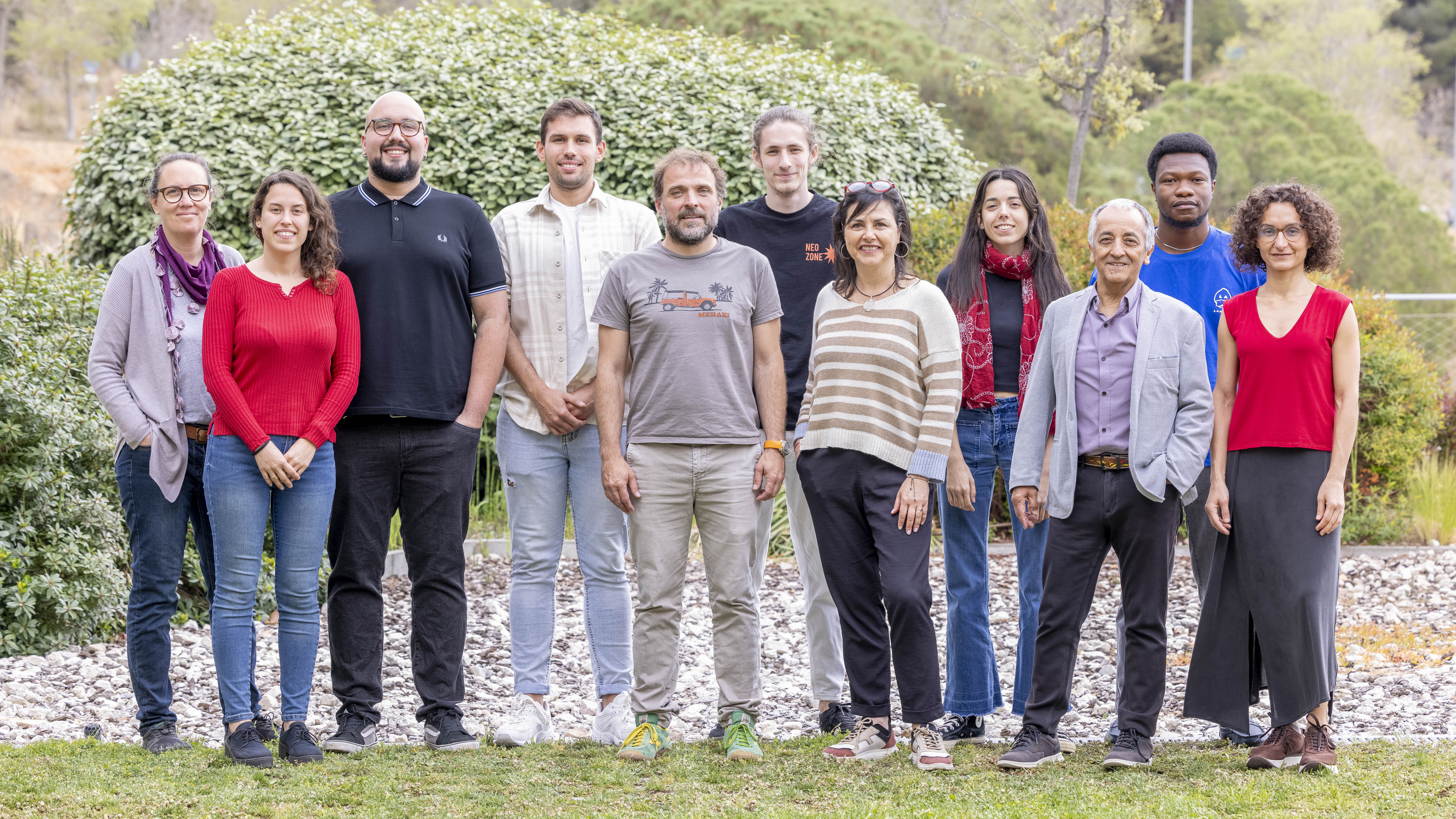About
The Plasmodium vivax and Extracellular Vesicles Research Group is co-led by two principal investigators: Hernando A. del Portillo, ICREA Research Professor, and Carmen Fernandez-Becerra, Associated Research Professor at Barcelona Institute for Global Health (ISGlobal). They joined IGTP in November 2015 through a collaborative agreement between ISGlobal and IGTP.
This research group is recognised as a Consolidated Research Group by the AGAUR (Agència de Gestió i Ajuts Universitaris i de Recerca) (2021 SGR 01554).

The group brings their expertise in malaria and exosome research, extracellular vesicles (EVs) of endocytic origin, with a very strong motivation to produce translational impact. The group uses a series of molecular and cellular biology technologies combined with immune-epidemiological studies in endemic regions of vivax malaria (i) to study the biology of the parasite, (ii) to study the role of circulating EVs form natural infections in host-parasite intercellular communication, to unveil mechanistic insights into cryptic erythrocytic infections in the spleen and bone marrow, and (iii) to discover new biomarkers of parasitic infections associated with circulating EVs. In addition, the group is pioneering the use of reticulocyte-derived exosomes as a new vaccine and platform against malaria. To this end, Dr. del Portillo has co-founded INNOVEX THERAPEUTICS SL, the first Spanish spin-off devoted to the use of exosomes as new therapeutic agents and diagnostic tools. It is important to note that the spin-off is presently located at IGTP.
Additionally, the group has implemented small-scale soluble protein production in the cell-free wheat germ system for multiplex immunological assay, in vivo imaging of malaria parasites, CRISPR-Cas9 technology for functional assays with malaria parasites, humanized mouse models and organs-on-a-chip technology to advance on their studies of cryptic asymptomatic infections and development of a culture system for P. vivax. These research areas and technologies are therefore amenable for collaborations with groups working on extracellular vesicles, vaccines and hematological disorders at IGTP.
The research of the group is fully compatible with the possibility of creating a future horizontal Institutional project to develop vaccines against HIV, TB and malaria, together known as the "big three" and responsible for a staggering 5.6 million deaths annually.
Keywords: Plasmodium vivax, exosomes, extracellular vesicles, malaria, vaccines, hematological disorders.

Research lines
Exosome-mediated mechanisms of non-hypnozoite cryptic infections in P. vivax malaria
Strong support of non-hypnozoite cryptic infections, mainly in the spleen and bone marrow, has been published. Noticeably, extracellular vesicles in the size range of exosomes obtained from human patients facilitated binding to the human spleen. The group thus hypothesizes that EVs, specifically reticulocyte-derived exosomes, from P. vivax infections mediate bone marrow defects on erythropoiesis and spleen extramedullary erythropoiesis facilitating cryptic infections likely responsible for asymptomatic transmission. As this species cannot be continuously culture in vitro, proving this hypothesis represents a major technical challenge. Two different approaches implementing new human science technological frontiers are being pursued, organs-on-a-chip and humanized mouse models of these human organs, thus facilitating to stringently test the role of exosomes as intercellular communicators in a space and velocity that will facilitate their uptake by cells in these hemopoietic tissues.
Reticulocyte-derived exosomes (Rex) vaccines against P. vivax
T-cell responses were believed not to play a major role in natural immunity against blood stages of malaria as P. falciparum, the most virulent human malaria parasite, predominantly invades mature red blood cells which lack antigen presenting machinery. However, the group's recent study demonstrated that reticulocyte exosomes contain HLA Class I antigens actively up taken by dendritic cells and that circulating extracellular vesicles directly obtained from patients contained novel parasite antigens 4. These results support further studies of reticulocyte exosomes from vivax infections to discover new antigens for vaccination and of human reticulocyte exosomes as a potential vaccine delivery platform for eliciting cytotoxic T-cell responses against vivax malaria.
Hypnozoite biomarker discovery
The team is using human liver-chimeric FRG-KO-(huHep) mice treated with schizonticidal drugs to determine the proteome composition of plasma-derived exosomes from animals exclusively infected with P. vivax hypnozoites. Moreover, their previous proteome analysis showed the presence of unique human proteins that are presently being used to highly enriched exclusively for exosomes coming from human hepatocytes; thus, increasing the signal for biomarker discovery. They will produce 3-5 unique parasite proteins and monoclonal antibodies against them to facilitate the construction of microfluidic devices with the ultimate goal of developing POC diagnostic device easily deployable in the field to contribute to the elimination of vivax malaria.
Functional analysis of subtelomeric variant genes
As infected reticulocytes with mature developmental stages of P. vivax are detected in the peripheral circulation, it has been amply accepted that there is no cytoadherence, hence no sequestration in this species. Against this dogma, this research group identified the largest subtelomeric multigene family of human malaria parasites, the vir multigene family with expressed VIR proteins, likely involved in vivax pathology through cytoadherence of (pRetics). Proof-of-principle of vivax pRetics cytoadherence partly mediated by VIR proteins was later demonstrated in vitro using endothelial, placental and brain cells, and more recently the group demonstrated that a P. falciparum transgenic line expressing a VIR protein was able to cytoadhere to human spleen fibroblasts. Its researchers are performing functional binding assay of variant surface proteins expressed in the human bone marrow and spleen during natural infections using CRISPR/cas-9 technologies to produce new transgenic lines of P. falciparum.
Extracellular vesicles (EVs) as potential new biomarkers in parasitic infections
The fact that EVs have been found in most biological fluids makes them an important target for the identification of new biomarkers in parasitic infections. In Chagas disease, the group is exploring EVs for identifying novel biomarkers specifically in the context of therapeutic response and disease progression during the chronic phase of the disease. In the field of Leishmaniasis, PvREX has recently started a collaborative project, planned to characterize EVs recovered from plasma in different clinical groups of human leishmaniasis (symptomatic, asymptomatic, treated). In parallel, the group also intends to evaluate the potential of extracellular vesicles as biomarkers for canine leishmaniasis. More recently, it has started a new collaborative project to identifying EV-Biomarkers in the context of severe P. falciparum malaria in children.
Active projects
Plasmodium vivax and Extracellular Vesicles Research Group (PVREX) recognised as a Consolidated Research Group (GRC)
PI: Carmen Fernández Becerra, Hernando A. Del Portillo
Funding agency: Agència de Gestió d'Ajuts Universitaris i de Recerca (AGAUR)
Agency code: 2021 SGR 01554 G65341695
Start date: 2023
End date: 2025

Novel organ-on-a-chip technology to study extracellular vesicles-mediated cryptic infections in Plasmodium vivax malaria
PI: Hernando A. Del Portillo
Funding agency: Fundación "laCaixa"
Agency code: LCF/PR/HR21/52410021
Start date: 2021
End date: 2024

CIBER en Enfermedades Infecciosas (CIBERINFEC)
PI: Joaquim Gascon
Funding agency: Instituto de Salud Carlos III (ISCIII)
Agency code: INFECG21/2022
Start date: 2021
End date: 2024

Plasmodium vivax: a cryptic parasite challenging malaria elimination
PI: Carmen Fernández Becerra, Hernando A. Del Portillo
Funding agency: Ministerio de Ciencia e Innovación Español (MICINN)
Agency code: PID2019-111795RB-I00
Start date: 2020
End date: 2023

Extracellular vesicles as novel prognostic biomarkers for Chagas disease, an emerging chronic infection in Catalonia
PI: Carmen Fernández Becerra
Funding agency: La Marató de TV3
Agency code: 566/U/2018
Start date: 2019
End date: 2023

Uso de Vesículas extracelulares (EVs) como herramienta para la identificación de nuevos biomarcadores en la enfermedad de Chagas
PI: Carmen Fernández Becerra, Joaquim Gascon
Funding agency: Mundo Sano
Date: 2027

Scientific publications
Esteves S, Lima C, Costa I, Osório H, Fernandez-Becerra C, Santarém N, Cordeiro-da-Silva A. Characterization and Proteomic Analysis of Plasma EVs Recovered from Healthy and Diseased Dogs with Canine Leishmaniosis. Int J Mol Sci. 2023 Mar 13;24(6):5490. DOI: 10.3390/ijms24065490.
Aparici-Herraiz I, Gualdrón-López M, Castro-Cavadía CJ, Carmona-Fonseca J, Yasnot MF, Fernandez-Becerra C, Del Portillo HA. Antigen Discovery in Circulating Extracellular Vesicles From Plasmodium vivax Patients. Front Cell Infect Microbiol. 2022 Jan 24;11:811390. DOI: 10.3389/fcimb.2021.811390.
Fernandez-Becerra C, Aparici-Herraiz I, Del Portillo HA. Cryptic erythrocytic infections in Plasmodium vivax, another challenge to its elimination. Parasitol Int. 2022 Apr;87:102527. DOI: 10.1016/j.parint.2021.102527.
Brito MAM, Baro B, Raiol TC, Ayllon-Hermida A, Safe IP, Deroost K, Figueiredo EFG, Costa AG, Armengol MDP, Sumoy L, Almeida ACG, Hounkpe BW, De Paula EV, Fernandez-Becerra C, Monteiro WM, Del Portillo HA, Lacerda MVG. Morphological and Transcriptional Changes in Human Bone Marrow During Natural Plasmodium vivax Malaria Infections. J Infect Dis. 2022 Apr 1;225(7):1274-1283. DOI: 10.1093/infdis/jiaa177.
Aparici Herraiz I, Caires HR, Castillo-Fernández Ó, Sima N, Méndez-Mora L, Risueño RM, Sattabongkot J, Roobsoong W, Hernández-Machado A, Fernandez-Becerra C, Barrias CC, Del Portillo HA. Advancing Key Gaps in the Knowledge of Plasmodium vivax Cryptic Infections Using Humanized Mouse Models and Organs-on-Chips. Front Cell Infect Microbiol. 2022 Jul 4;12:920204. DOI: 10.3389/fcimb.2022.920204.
Madeira RP, Meneghetti P, de Barros LA, de Cassia Buck P, Mady C, Ianni BM, Fernandez-Becerra C, Torrecilhas AC. Isolation and molecular characterization of circulating extracellular vesicles from blood of chronic Chagas disease patients. Cell Biol Int. 2022 Jun;46(6):883-894. DOI: 10.1002/cbin.11787.
Gualdrón-López M, Díaz-Varela M, Zanghi G, Aparici-Herraiz I, Steel RWJ, Schäfer C, Cuscó P, Chuenchob V, Kangwangransan N, Billman ZP, Olsen TM, González JR, Roobsoong W, Sattabongkot J, Murphy SC, Mikolajczak SA, Borràs E, Sabidó E, Fernandez-Becerra C, Flannery EL, Kappe SHI, Del Portillo HA. Mass Spectrometry Identification of Biomarkers in Extracellular Vesicles From Plasmodium vivax Liver Hypnozoite Infections. Mol Cell Proteomics. 2022 Oct;21(10):100406. DOI: 10.1016/j.mcpro.2022.100406.
Cortes-Serra N, Gualdron-Lopez M, Pinazo MJ, Torrecilhas AC, Fernandez-Becerra C. Extracellular Vesicles in Trypanosoma cruzi Infection: Immunomodulatory Effects and Future Perspectives as Potential Control Tools against Chagas Disease. J Immunol Res. 2022 Aug 17;2022:5230603. DOI: 10.1155/2022/5230603.
Tsuboi T, Del Portillo HA, Mueller I. Editorial on the special issue on Plasmodium vivax: Current situation and challenges towards elimination. Parasitol Int. 2022 Aug;89:102594. doi: 10.1016/j.parint.2022.102594.
News
VÍDEO: Cicle de vida de 'Plasmodium vivax': nous estadis eritrocítics críptics
Per comprendre millor la complexitat de les infeccions per P. vivax, el projecte "Novel organ-on-a-chip technology to study extracellular vessicles-mediated cryptic infections in Plasmodium vivax malària", impulsat per CaixaResearch, ha produït aquest vídeo per difondre idees clau sobre les infeccions eritrocítiques críptiques. La iniciativa està liderada per Hernando A del Portillo i Carmen Fernández-Becerra, líders del Grup de Recerca Plasmodium vivax i Exosomes (PvREX) a l'Institut de Salut Global de Barcelona (ISGlobal) i l'Institut de Recerca Germans Trias i Pujol (IGTP) a Espanya.
Noves directrius per a l'estudi de paràsits mitjançant vesícules extracel·lulars
Un grup de l'IGTP i d'ISGlobal ha contribuït a elaborar un document amb noves directrius per a l'aïllament i la caracterització de vesícules extracel·lulars en la recerca de malalties parasitàries. L'estudi, publicat a la revista Journal of Extracellular Biology, podria millorar la nostra comprensió de les interaccions hoste-paràsit i avançar en el diagnòstic precoç, el tractament i la prevenció de malalties causades per paràsits.
Contact
Hernando A. Del Portillo
(+34) 93 033 05 36
Carmen Fernández Becerra
(+34) 93 554 30 50 extn. 6492
More links
Innovex Therapeutics SL · PvREX webpage · Hernando A. Del Portillo at ISGlobal · Carmen Fernández Becerra at ISGlobal · HIDDENVIVAX webpage

